IVP Pauline Studies Collection (12 vols.)
Digital Logos Edition
Overview
The IVP Pauline Studies Collection brings together 12 important volumes of recent Pauline literature, providing in-depth focus on his life, letters, missionary work, and theology. It contains contributions from today’s top Pauline scholars, including Ben Witherington III, N. T. Wright, and Frank Thielman. These works analyze the cultural milieu, rhetorical strategies, and the deep layers of the Hebraic prophetic tradition informing Paul’s writings. They provide differing opinions on Paul’s doctrine of justification. Numerous works shine light on the “New Perspective on Paul” conversation. And several works provide the framework for better understanding Paul’s world in the first century.
Logos Bible Software dramatically improves the value of the IVP Pauline Studies Collection by enabling you to find what you’re looking for with unparalleled speed and precision. The Logos edition is fully searchable and easily accessible. Scripture passages link directly to your preferred English translation and to the original language texts, and important theological concepts link to dictionaries, encyclopedias, and a wealth of resources in your digital library.

- Examines Paul’s life, letters, missionary work, and theology
- Analyzes the Pauline Epistles in their literary, ancient, and modern contexts
- Provides studies on Paul’s views on justification, salvation, the mission of the church, and more
- Title: IVP Pauline Studies
- Publisher: IVP Press
- Volumes: 12
- Pages: 4,872
This title is included in the following collections
You can save when you purchase this product as part of a collection.
IVP New Testament Collection (...
$831.75$714.99InterVarsity Press Ultimate Co...
$13,731.48$10,219.99InterVarsity Press Academic Re...
$14,013.38$11,199.99
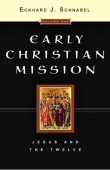
Early Christian Mission, Volume 1: Jesus and the Twelve
- Author: Eckhard J. Schnabel
- Publisher: IVP Press
- Publication Date: 2004
- Pages: 1,074
How is it that a first-generation Jewish messianic movement undertook a mission to the pagan world and rapidly achieved a momentum that would have a lasting and significant impact on world history? This momentous question has surprisingly eluded the concentrated focus of historians and New Testament scholars. Perhaps it is because the story of early Christian mission encompasses so much of the history of early Christianity. And to tell that history is to traverse a broad spectrum of issues in contemporary New Testament studies, all of which have been investigated in specialized depth, though frequently unconnected to a unified picture. On the other hand, as Eckhard Schnabel comments, those who have attempted to paint “the portrait of early Christian missions” have “often painted with brush strokes too broad.” As a result, an “undifferentiated picture of early Christian mission” is widely held.
In this monumental study, Schnabel gives us both a unified and detailed picture of the rise and growth of early Christian mission. He begins with a search for a missionary impulse in the Old Testament and Second Temple Judaism. He then weighs the evidence for a mission of Jesus to Gentiles. But the center of focus is the apostolic missionary activity as it is related in Acts, Paul’s letters, and the rest of the New Testament.
Here is a study that seeks to describe all the evidence relevant to the missionary strategy and tactics of the early church, to explain the theological dimensions of the early Christian mission, and to integrate the numerous studies published in the last decades into a synthetic overall picture. Schnabel’s detailed and immensely informed analysis will reward careful reading and reflection, and form a solid basis for a new understanding of the rise of Christianity and the nature of Christian mission—both then and now.
Comparatively few biblical studies of mission exist. Those that do were written primarily by missiologists. Most New Testament scholars, even a number of fairly conservative ones, doubt that Second Temple Judaism or even Jesus himself significantly foreshadowed the missionary zeal of the early church beyond Jewish circles. What would a comprehensive study of the relevant New Testament data yield, especially if prefaced by a survey of Old Testament and intertestamental developments, and undertaken by someone who has mastered the secondary New Testament literature in all three major European languages? The result is a magnum opus, for both Schnabel and the discipline, that should be the defining work on this topic for years to come.
—Craig L. Blomberg, Denver Seminary
The sheer size of this book demonstrates not only the fantastically wide knowledge of its author but also and above all the way in which the activity of mission permeates the New Testament story. There is nothing else available that can compare with this major treatment which discusses every aspect of the subject in the light of constant, critical interaction with current scholarship and yet manages to remain beautifully clear and immensely readable. This book is, quite simply, indispensable for the New Testament student.
—I. Howard Marshall, University of Aberdeen
The publication in English of Eckhard Schnabel’s magisterial work on early Christian mission is a major event for which both author and publisher are to be congratulated most warmly. This amazing achievement, which carefully sets the Christian mission within its wide-ranging historical and geographical contexts, and considers the mission theology of the biblical material, fills a vast gap left for more than one hundred years since the appearance of Adolf von Harnack’s work on the spread of Christianity. Whether it is the relevant teaching of the Old Testament on this theme, the nature of Jesus’ mission and that of his apostles, the mission theology of each of the Evangelists, what the Acts of the Apostles tells us about the spread of Christianity, or the motivation, practice and theology of Paul’s missionary endeavors, Dr. Schnabel’s comprehensive volume is a profoundly reliable guide, and provides countless insights that will inform and inspire the reader. A former missionary to the Philippines, he writes fully, judiciously and with conviction about a subject that lies close to his heart. It is an outstanding work to which I shall return again and again.
—Peter T. O’Brien, Moore Theological College
As strange as it may seem, since the time of Adolf von Harnack at the turn of the twentieth century there has never been an attempt at a comprehensive critical account of the earliest period of Christian missions. Now in his massive and magisterial two-volume work that ignores neither history nor theology, Eckhard Schnabel has sought to remedy this gap in scholarly research. I predict that scholars will be interacting with this work for decades to come because of its thoroughness, meticulous attention to detail, and integration of knowledge from fields as wide-ranging as archaeology, classics, Roman and Jewish history, linguistics, sociology and of course biblical studies. This is a book every serious student of early Christianity must have on his shelf. There is nothing else quite like it.
—Ben Witherington III, Asbury Theological Seminary
Professor Eckhard Schnabel’s Early Christian Mission is a masterpiece that stands in the tradition of Harnack and Lietzmann. Schnabel first judiciously traces the origins of early Christian mission and then skillfully identifies the diverse expressions of mission in the early Christian movement, from Jesus to Paul and beyond. In doing this he creates the historical, social and religious context in which the writings of the New Testament and related literature can be meaningfully read and appreciated and in the light of which the origins of Christianity can be understood with much greater precision. Professor Schnabel has placed us all in his debt.
—Craig A. Evans, Acadia Divinity College
Eckhard J. Schnabel (PhD, University of Aberdeen) is Mary F. Rockefeller Distinguished Professor of New Testament Studies at Gordon-Conwell Theological Seminary in South Hamilton, Massachusetts. He has taught previously at Trinity Evangelical Divinity School (Deerfield, Illinois), Freie Theologische Akademie (Giessen, Germany), Wiedenest Bible College (Bergneustadt, Germany), and Asian Theological Seminary (Manila, Philippines).
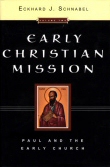
Early Christian Mission, Volume 2: Paul and the Early Church
- Author: Eckhard J. Schnabel
- Publisher: IVP Press
- Publication Date: 2004
- Pages: 898
How is it that a first-generation Jewish messianic movement undertook a mission to the pagan world and rapidly achieved a momentum that would have a lasting and significant impact on world history? This momentous question has surprisingly eluded the concentrated focus of historians and New Testament scholars. Perhaps it is because the story of early Christian mission encompasses so much of the history of early Christianity. And to tell that history is to traverse a broad spectrum of issues in contemporary New Testament studies, all of which have been investigated in specialized depth, though frequently unconnected to a unified picture. On the other hand, as Eckhard Schnabel comments, those who have attempted to paint “the portrait of early Christian missions” have “often painted with brush strokes too broad.” As a result, an “undifferentiated picture of early Christian mission” is widely held.
In this monumental study, Schnabel gives us both a unified and detailed picture of the rise and growth of early Christian mission. He begins with a search for a missionary impulse in the Old Testament and Second Temple Judaism. He then weighs the evidence for a mission of Jesus to Gentiles. But the center of focus is the apostolic missionary activity as it is related in Acts, Paul’s letters, and the rest of the New Testament.
Here is a study that seeks to describe all the evidence relevant to the missionary strategy and tactics of the early church, to explain the theological dimensions of the early Christian mission, and to integrate the numerous studies published in the last decades into a synthetic overall picture. Schnabel’s detailed and immensely informed analysis will reward careful reading and reflection, and form a solid basis for a new understanding of the rise of Christianity and the nature of Christian mission—both then and now.
Schnabel’s presentation of the early Christian mission conveys a sense of reality . . . the careful examination of secondary literature . . . add[s] credibility.
—Journal of the Evangelical Theological Society
An encyclopedia of missions in the first century . . . Clearly written . . . Reads as a continuous historical account.
—EMQ
Any one interested in the mission of the early church . . . will remain indebted for a long time to Schnabel for this treasure trove of information. What it lacks in exciting narrative is more than compensated for by its encyclopedic usefulness.
—Themelios
A welcome resource for historians, NT exegetes, and present-day Christian missionaries.
—Bulletin for Biblical Research
This two-volume set by Eckhard Schnabel is a remarkable achievement. I finished working my way through the nearly 1,600 pages of text, and despite the length found myself enjoying it immensely. It is a a unique blend of history, exegesis, theology and praxis rolled into one. Schnabel is to be commended for this breathtaking achievement.
—Biblical Theology
Early Christian Mission humbly yet authoritatively reveals the author’s unapologetic, intelligent, exhaustive, and very lucid defense of his conservative understanding of the Christian church’s early evangelical mission. The sheer scope of Schnabel’s research and presentation is daunting to the most energetic reader because of its breadth and scope.
—Midwestern Journal of Theology
Eckhard J. Schnabel (PhD, University of Aberdeen) is Mary F. Rockefeller Distinguished Professor of New Testament Studies at Gordon-Conwell Theological Seminary in South Hamilton, Massachusetts. He has taught previously at Trinity Evangelical Divinity School (Deerfield, Illinois), Freie Theologische Akademie (Giessen, Germany), Wiedenest Bible College (Bergneustadt, Germany), and Asian Theological Seminary (Manila, Philippines).
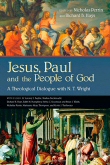
At the 2010 Wheaton Theology Conference, leading New Testament scholar N. T. Wright and nine other prominent biblical scholars and theologians gathered to consider Wright’s prolific body of work. Compiled from their presentations, this volume includes Tom Wright’s two main addresses, one on the state of scholarship regarding Jesus and the other on the state of scholarship regarding the apostle Paul. The other nine essays critically interact with these two major themes of Wright’s works.
Much appreciation is shown, overviews are given, perspective is provided, and some pointed questions are also raised. Together these essays represent the best of critical yet charitable dialogue among serious and rigorous scholars on theological themes vital to Christian faith that will propel New Testament scholarship for the next decade to come.
With essays by:
- Jeremy Begbie
- Markus Bockmuehl
- Richard B. Hays
- Edith M. Humphrey
- Sylvia Keesmaat and Brian Walsh
- Nicholas Perrin
- Marianne Meye Thompson
- Kevin J. Vanhoozer
This book propels New Testament scholarship into the next decade.
—Wheaton Alumni Magazine
This is a fabulous, learned, and enjoyable cohort of essays in dialogue with one of the most influential Christian scholars of our time. It celebrates Wright’s work, but he does not receive a free run on any subject either. It is well worth reading for those interested in the interface between biblical studies and systematic theology.
—Journal of the Evangelical Theological Society
Nicholas Perrin holds the Franklin S. Dyrness Chair of Biblical Studies at the Wheaton College Graduate School. Between 2000 and 2003, he was research assistant for N. T. Wright.
Richard B. Hays is dean of the Divinity School and George Washington Ivey Professor of New Testament at Duke University, Durham, North Carolina.
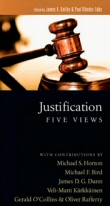
“Therefore, since we have been justified by faith, we have peace with God through our Lord Jesus Christ” (Romans 5:1). When Paul wrote these words he seemed confident he had made himself clear. But for centuries the Pauline doctrine of justification has been a classic point of interpretation and debate in Christian exegesis and theology. And while in recent decades there have been moments of hopeful convergence among the various traditions of the Western church, the fine print often reveals more facets and distinctions than ever before.
This volume focuses on five views of justification and calls on representative proponents to set forth their case and then respond to each other. The five views are:
- Traditional Reformed (Michael S. Horton)
- Progressive Reformed (Michael F. Bird)
- New Perspective (James D. G. Dunn)
- Deification, or Theosis (Veli-Matti Kärkkäinen)
- Roman Catholic (Gerald O’Collins and Oliver Rafferty)
In addition, editors James Beilby, Paul R. Eddy, and Steven E. Enderlein provide an extensive introduction to the issues informing this important debate. This distinguished forum of biblical interpreters and theologians offers a lively and informative engagement with the biblical, historical and contemporary understandings of justification. Justification: Five Views is not only a fascinating probe into Paul’s meaning, it is also a case book in theological method.
A wonderfully useful book. After a superb historical survey of the issues to be debated, five influential approaches to the doctrine of justification by faith are presented and defended by credible and engaging representatives. I can think of no better introduction to these important debates than this outstanding volume.
—Alister E. McGrath, King’s College, London
No single volume could possibly cover all Christian views of the doctrine of justification. Justification: Five Views courageously selects five contemporary views and helpfully presents and critiques them. Each view is expounded and defended by a leading proponent and then critiqued by other contributors. Anyone interested in the current discussion about this crucial Christian doctrine must read this book. It sheds more light than heat in an area of theology almost burned over by heated polemics. Of all the ‘views’ books out there, this is one of the best.
—Roger E. Olson, professor of theology, George W. Truett Theological Seminary, Baylor University
Beilby and Eddy have raised the bar with regard to this multiple views genre, this time bringing together world-renowned scholars and theologians to engage a very hot topic. Reading Justification: Five Views is like being treated to five books by five masters of their craft, each going deep into the details at times but yet also stepping back to cover the forest ably enough for the less initiated to appreciate what is at stake. A must-read for those interested in the ecumenical implications of the doctrine of justification.
—Amos Yong, Regent University School of Divinity
Of all the multiple views books, this one was needed most. It is also perhaps the best yet: getting Horton, Dunn, Bird, Kärkkäinen, O’Collins, and Rafferty all at the table at the same time under the same roof is both a tour de force and a brilliant example of how their interaction can teach each of us. One word is needed most for the justification debate at work among (mostly) evangelicals, the word listen, and if you listen to the pages of this book you will see examples of not listening and listening. The challenge remains for all of us: will we listen again to the Scriptures to hear what it says about justification? Or will we impose our systems of thought on the Bible?
—Scot McKnight, North Park University
James K. Beilby (PhD, Marquette University) is professor of systematic and philosophical theology at Bethel University in St. Paul, Minnesota.
Paul R. Eddy (PhD, Marquette University) is professor of theology at Bethel University in St. Paul, Minnesota.
Steven E. Enderlein is associate professor of biblical studies at Bethel University.
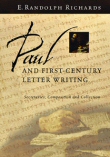
Traditional Christian art depicts Paul the letter writer, pen in hand, attentive to the Spirit. We might think we know better and imagine him pacing in agitation as he rapidly dictates to a secretary his letter to the Galatians. But in reality neither of these pictures is accurate.
In Paul’s day, producing a letter was a time-consuming and costly business. And we have ample resources from the ancient world to piece together what it must have been like. A secretary was usually part of the picture. But so were notes, drafts, corrections and careful rewrites, not to speak of scratchy pens, sooty ink and coarse papyrus. Interestingly, there is evidence that Paul involved his missionary team in the writing of letters. And then came the delivery over land and sea, the reading and circulation, as well as the epistolary afterlife of copying, collecting and storing.
E. Randolph Richards has extensively studied ancient letter writing and secretaries. Informed by the historical evidence and with a sharp eye for telltale clues in Paul’s letters, he takes us into this world and places us on the scene with Paul the letter writer. What first appears to be just a study of secretaries and stationery turns out to be an intriguing glimpse of Paul the letter writer that overthrows our preconceptions and offers a new perspective on how this important portion of Christian Scripture came to be.
Amplifying his astute monograph, The Secretary in the Letters of Paul, Dr. Richards offers here an insightful, well-organized and very readable study of an important issue in New Testament research. He is at his best in the discussion of secretaries and their tools in the ancient world. While not all will agree with every viewpoint expressed, all can profit from this important contribution to our discipline.
—E. Earle Ellis, Southwestern Baptist Theological Seminary
A comprehensive, impressive, insightful, informative and engaging account of letter writing in the ancient world with primary emphasis on the composition and collection of Paul’s letters. Richards builds upon—but expands—his earlier work The Secretary in the Letters of Paul by including additional information about the mechanics of writing letters (all the ‘nuts and bolts’), the role of coauthors and colleagues (such as Timothy, Sosthenes, Tertius, Silas), and the significance of preformed material and interpolations for understanding issues of Pauline authorship. The book is the fruit of sound historical research and cautious scholarship. It is a major contribution to the field, bound to be read with profit and treasured by teachers, pastors and students of the New Testament.
—Arthur G. Patzia, professor of New Testament, Fuller Northern California
For those who want an over-the-shoulder look into Paul’s world, this is the book. Richards guides the reader with a sure hand, sifting through a wide array of ancient texts and artifacts to reconstruct an engaging picture of Paul’s letter writing. But there are bonus features: one also learns about life in the city and marketplace; travel by land and sea; customs at home, school, and in the company of friends; and a host of other topics. Rarely does a book this size offer so many insights, sometimes challenging common opinion but always illuminating. This treasure trove, written in readable style with eye-catching pages, will attract students of Paul and Greco-Roman history again and again.
—Bruce Corley, president and professor of New Testament and Greek, B. H. Carroll Theological Institute
A welcome and accessible contribution to Pauline and epistolary studies. It contains a wealth of material . . . that effectively sets Paul and his letters against the backdrop of first-century letter writing conventions.
—Journal of the Evangelical Theological Society
Richards has rendered a service to all by writing an extremely accessible book that avoids scholarly jargon to allow anyone who is interested in this topic to see how this relates to Paul the letter writer. Bible collectors and others seriously interested in the Bible will not look at Paul’s letters in the same way again after reading this most readable book.
—Bible Editions & Versions
E. Randolph Richards (MDiv and PhD, Southwestern Baptist Theological Seminary) is dean of the School of Ministry and professor of biblical studies at Palm Beach Atlantic University in West Palm Beach, Florida. He has frequently served as an interim or “supply” pastor, and from 1988 to 1996 he was a missionary with the International Mission Board, SBC, stationed in East Indonesia.
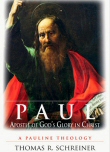
Every serious student of the New Testament and of Christian theology must come to grips with the apostle Paul. In Paul, Apostle of God’s Glory in Christ, Thomas R. Schreiner gives us a sound and insightful exposition and assessment of Paul’s theology that is well-geared to the needs of seminary students and working pastors.
While thoroughly informed by the issues of contemporary Pauline studies, he offers an account of Paul’s theology that is relatively unburdened by scholarly trappings but deals directly with the matter. “The goal of writing a Pauline theology,” he writes, “is to unearth Paul’s worldview and to present it to contemporaries. Our task is not merely to reproduce Paul’s thinking on various topics but to rightly estimate what is most important in his thinking and to set forth the inner connections between the various themes.”
Like most writers of a Pauline theology, Schreiner discerns something at the heart and soul of Paul’s theology. As Schreiner puts it, “The passion of Paul’s life, the center and foundation and capstone of his vision, and the animating motive of his mission was the supremacy of God in and through the Lord Jesus Christ.” Schreiner has stitched this theme into the fabric of his book, and the result is a Pauline theology that is not only informative, but spiritually uplifting, as well. Here is a Pauline theology eminently suited to the needs of theological students and preachers.
In light of the considerable body of scholarship on Paul, writing a theology of the apostle is a daunting task indeed. Taking his methodological cue from Schlatter’s maxim of ‘seeing what is there,’ Schreiner admirably succeeds in his task by providing a highly competent treatment that is distinctive in at least three ways: focusing on Paul as a missionary; identifying ‘God in Christ’ as the center of Pauline theology; and affirming all 13 letters attributed to Paul as authentic. While not quite as extensive as James Dunn’s recent The Theology of Paul the Apostle, Schreiner’s work breathes a more conservative evangelical flavor, which is sure to make it the preferred text in many classes on the subject.
—Andreas Köstenberger, Southeastern Baptist Theological Seminary
Dr. Schreiner has produced a deeply exegetical study of Paul’s theology. Even those who disagree with some of his conclusions will benefit from his careful analysis of the text of Paul’s letters and his fair-handed treatment of alternative positions. The book will be especially useful to students and pastors, but scholars will also profit from its thoughtful exegetical discussions and its persuasive case for the centrality of God’s glory in Christ to Paul’s theology.
—Frank Thielman, Beeson Divinity School
Tom Schreiner’s abilities as a skilled exegete and a good writer come together well in this superb volume on Pauline theology. Schreiner not only presents the major themes of Pauline theology with exceptional clarity but also provides illuminating insight into the difficult issues in Pauline studies today and numerous applications to the life of the contemporary church. In light of the current critical tendency to discount the Pauline authorship of Ephesians, Colossians and the Pastoral Epistles, it is refreshing to read a volume on the theology of Paul that gives these letters their rightful place in the representation of his theology.
—Clinton E. Arnold, Talbot School of Theology
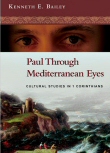
Paul was a Hebrew of the Hebrews, steeped in the learning of his people. But he was also a Roman citizen who widely traveled the Mediterranean basin, and was very knowledgeable of the dominant Greek and Roman culture of his day. These two mighty rivers of influence converge in Paul’s first letter to the Corinthians.
With razor-sharp attention to the text, Kenneth Bailey examines the cultural milieu and rhetorical strategies that shaped this pivotal epistle. He discovers the deep layers of the Hebraic prophetic tradition informing Paul’s writing, linking the Apostle with the great prophets of the Old Testament.
Throughout, Bailey employs his expert knowledge of Near Eastern and Mediterranean culture to deliver to readers a new understanding of Paul and his world. Familiar passages take on a new hue as they are stripped of standard Western interpretations and rendered back into their ancient setting.
Bailey has done an important service in identifying these structures and the way in which they can help us understand in a deeper way Paul’s intent in the letter. The book should be a rich resource for interpreters, and especially those who desire to see the rich theology underlying Paul’s practical concerns.
—Journal of the Evangelical Theological Society
Kenneth Bailey’s new volume, Paul Through Mediterranean Eyes, is a refreshing reminder that for those willing to mine more deeply into the biblical text, precious gems can really be found. Bailey offers an impressive, and genuinely original, contribution to the study of 1 Corinthians that both New Testament scholars and pastors will appreciate. . . . [he] has produced a tremendous piece of scholarship that is intriguing, illuminating, and distinctive.
—Southeastern Theological Review
Bailey’s warm pastoral style, up-to-date scholarship and attention to theology make for an excellent exposition of Paul’s argument in 1 Corinthians. His unparalleled knowledge of the New Testament in Arabic translation, coupled with his lifetime of experience in the Middle East, gives Bailey a unique perspective on the biblical text. Highlighting Paul’s rhetorical argument and extensive use of Jewish Scriptures, Bailey’s work is a rare commentary that serves both pastor and layperson. This book sets a high standard for clarity and practical wisdom in the field of biblical exposition.
—Lynn H. Cohick, professor of New Testament, Wheaton College
This scholarly yet accessible study is a helpful addition to any bookshelf—even those crowded with commentaries on First Corinthians.
—Bible Study Magazine
Paul Through Mediterranean Eyes is a necessary addition to the libraries of all scholars and pastors working in or preaching from 1 Corinthians. Bailey’s writing is easy to follow, warm, and lucid. Though making some complex arguments and performing some deep analysis, the author never loses sight of the reader or of his goal to make Paul more accessible rather than less. This book is highly recommended for any serious reader of 1 Corinthians.
—Criswell Theological Review
Bailey adds significantly to our understanding of Paul’s style. Scholars are challenged to add a solid research footing to take up Bailey’s interpretations in their own work. Pastors and teachers will find this an excellent supplement to be used next to several other good commentaries. It will enhance not only their exegesis but also their sermons as they learn both from Paul’s theology and his rhetorical skill.
—Review of Biblical Literature
Kenneth E. Bailey is an author and lecturer in Middle Eastern New Testament studies. An ordained Presbyterian minister, he also serves as Canon Theologian of the Anglican Diocese of Pittsburgh. He holds graduate degrees in Arabic language and literature, and in systematic theology; his ThD is in New Testament. He spent 40 years living and teaching New Testament in Egypt, Lebanon, Jerusalem, and Cyprus, still holding the title of research professor (emeritus) of Middle Eastern New Testament studies at the Ecumenical Institute (Tantur), Jerusalem.
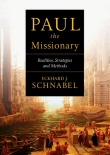
Eckhard Schnabel’s two-volume Early Christian Mission is widely recognized as the most complete and authoritative contemporary study of the first-century Christian missionary movement. Now in Paul the Missionary Schnabel condenses volume two of the set, drawing on his research to provide a manageable study for students of Paul as well as students and practitioners of Christian mission today.
Schnabel first focuses the spotlight on Paul’s missionary work—the realities he faced, and the strategies and methods he employed. Applying his grasp of the wide range of ancient sources and of contemporary scholarship, he clarifies our understanding, expands our knowledge and corrects our misconceptions of Paul the missionary.
In a final chapter, Schnabel shines the recovered light of Paul’s missionary methods and practices on Christian mission today. Much like Roland Allen’s classic Missionary Methods: St. Paul’s or Ours? of nearly a century ago, Schnabel offers both praise and criticism. For those who take the time to immerse themselves in the world of Paul’s missionary endeavor, this final chapter will be both rewarding and searching.
Following his landmark volume Early Christian Mission, Schnabel has written an equally useful volume on the missionary work, message and method of the apostle Paul. This work will prove invaluable to all serious students of Scripture and in particular to all missionary practitioners. A former missionary to the Philippines, Schnabel brings to this task the mind of a first-rate New Testament scholar and the heart of a disciple committed to help fulfill the Great Commission. Fittingly, the volume is dedicated to Peter O’Brien, who has likewise contributed significantly to the scholarly exploration of the Pauline mission. Highly recommended!
—Andreas J. Köstenberger, professor of New Testament and director of PhD studies, Southeastern Baptist Theological Seminary
While Professor Schnabel modestly claims merely to bring some of the benefits of the last one hundred years of New Testament and Greco-Roman sociological insights to Roland Allen’s work, he does so much more. Here is the new textbook for mission methodology. While technically limited to Paul, Schnabel covers the vital topics: goals, message, methods. The missions classroom has long needed this resource. Current and aspiring missionaries will benefit from what this scholar/missionary/teacher has to say.
—E. Randolph Richards, dean, School of Ministry, Palm Beach Atlantic University
In this magisterial work Schnabel carefully and thoroughly plumbs the New Testament data to develop a comprehensive picture of Paul’s approach to mission. His understanding of Paul as a missionary together with his application to selected issues in contemporary missiology provides an invaluable foundation for evaluating our contemporary approaches to mission ranging from the influence of cultural values (such as effectiveness and efficiency) to the latest fads (from church growth to people group thinking to communication theory to short-term missions). Missionaries and missiologists alike owe Schnabel our thanks for this penetrating work which will play a significant role in missions studies for years to come.
—A. Scott Moreau, professor of intercultural studies, Wheaton College, and editor, Evangelical Missions Quarterly
The reader will find much solid information in this substantial work.
—The Bible Today
Eckhard J. Schnabel (PhD, University of Aberdeen) is Mary F. Rockefeller Distinguished Professor of New Testament Studies at Gordon-Conwell Theological Seminary in South Hamilton, Massachusetts. He has taught previously at Trinity Evangelical Divinity School (Deerfield, Illinois), Freie Theologische Akademie (Giessen, Germany), Wiedenest Bible College (Bergneustadt, Germany), and Asian Theological Seminary (Manila, Philippines).
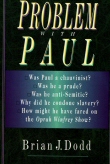
Was Paul a chauvinist? Was he a prude? Was he anti-Semitic? Why did Paul condone slavery? How might he have fared on the Oprah Winfrey Show? People outside the church have often found Paul hard to stomach. His views on women, sex and marriage, his failure to attack the institution of slavery, and his verbal attacks on his opponents have all come under fire.
Regrettably, Paul hasn’t always fared that much better among believers. Like the apostle Peter, many wonder what to make of Paul and his confusing, controversial—and sometimes apparently contradictory—teachings. Put simply, Paul just isn’t politically correct.
Brian Dodd offers a fresh look at the perpetually enigmatic and misunderstood Paul. Combining pastoral insight and scholarly rigor, he helps us bridge the gap between Paul’s ancient world and our postmodern setting. Here is much-needed perspective for making sense of Paul—the man and his message.
Brian J. Dodd (PhD, University of Sheffield) has served as a pastor, church planter, and seminary professor. He has led training in leadership development and evangelism in the US, UK, and in countries of the former Soviet Union. He lives in Florida.
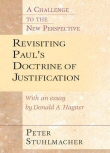
Since 1963, substantial objections have been raised against the traditional view of the Pauline doctrine of justification, mainly by New Testament scholars such as Krister Stendahl, E. P. Sanders, and James D. G. Dunn. This book evaluates the “New Perspective on Paul” and finds it wanting.
With appreciation for the important critique already offered by Donald Hagner, which is included in this volume, Peter Stuhlmacher mounts a forthright and well-supported challenge based on established and more recent scholarship concerning Paul’s understanding of justification. In particular he argues that the forensic and mystical elements of Paul’s doctrine of justification should not be played off against one another. Rather Paul’s understanding can be faithfully rendered only within the context of his apostolic mission to Jews and Gentiles and the expectation of the coming kingdom of God.
This book will be of interest to students and teachers of biblical studies, biblical theology and systematic theology, and to those engaged in Jewish-Christian dialogue, Protestant-Roman Catholic conversation about the doctrine of justification, or discussions of rival views of justification within Protestantism.
Peter Stuhlmacher is professor emeritus of New Testament at the University of Tubingen in Germany.
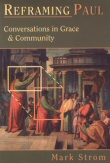
The Greco-Roman world was shaped by ideals and abstract ideas. The Apostle Paul left them behind. But they continue to shape evangelical teaching and practice.
This picture contradicts the common impression of Paul as an abstract theologian, someone who wrestled with deep theological doctrine while hovering six feet above everyday reality. But in fact, it was the philosopher’s of Paul’s day—and even some of Paul’s Christian opponents—who traded heavily in abstractions, one-way rhetoric and top-down hierarchies while depreciating the currency of common experience. By contrast, Paul the tentmaker was a conversationalist of God’s good news, a storyteller of Jesus Christ, an apostle who walked the avenues and back alleys of everyday reality. His passion was for communities of grace and conversation where the new reality of Christ was explored and embodied within the daily messiness of life.
Reframing Paul unveils this Paul in his original context and invites us to engage him on new terms. Courageously author Mark Strom draws Paul into vital conversation with contemporary evangelicalism. His book is for those who wonder why people leave churches for alternative spiritual paths—and who may even be tempted to do so themselves. More than anything, his book is for those who wonder what’s gone wrong and who want to learn how the church can be an attractive community of transforming grace and conversation.
If you are concerned about the way the Bible is sometimes taught today and sense that something is not quite right with some parts of evangelicalism, this is the book for you! Carefully researched and penetratingly argued, Mark Strom brings Paul, his culture and the contemporary church into dynamic and unsettling conversation. He shows that too much that goes on among conservative Christians reflects the attitudes and practices of the culture of Paul’s day rather than of Paul himself.
—Robert Banks, director and dean of Macquarie Christian Studies Institute in Sydney, Australia
In Reframing Paul, Mark Strom brings Paul’s writings back in touch with life as the apostle intended. In doing so, Strom challenges much contemporary theology and church life. Interpreters of Paul and those interested in the future of the evangelical church need to read this important and engaging book.
—Tremper Longman III, Robert H. Gundry Professor of Biblical Studies, Westmont College
Mark Strom has done two things in Reframing Paul—he has set Paul in the philosophical and religious setting in which he lived and ministered, and he has critiqued the evangelical church from the point of view of what he sees as Paul’s intention. His presentation of Paul is a service to anyone interested in the New Testament, for it clarifies Paul’s message by putting it into its setting and gives one readable access to Paul’s world. His critique of the evangelical church is challenging and should be read and considered by anyone concerned with doing church in our postmodern world. . . . Important reading for those interested in understanding Paul and must reading for those thinking about how to do church in our contemporary world.
—Peter H. Davids, theological educator, Innsbruck, Austria
This wide-ranging book includes an extensive reading of ancient sources and their best commentators, hermeneutical considerations on how to relate Paul’s grappling with his setting to our analogous settings today, and a challenge to today’s church to rethink our values and models in light of Scripture. Strom challenges us to ask ourselves whether the way we’ve always done things is the only (or even a correct) biblical way—a challenge we need to always readily consider.
—Craig S. Keener, professor of New Testament at Eastern Seminary in St. Davids, Pennsylvania
Mark Strom is currently the CEO of Second Road, a unique strategy and innovation firm based in Sidney, Australia. He was previously CEO of Laidlaw College in Auckland, New Zealand. Mark’s PhD explored the intellectual and social background of Paul and his place as a major innovator in western thought.
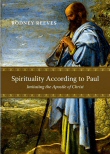
Spirituality often evokes images of quiet centeredness, meditative serenity and freedom from life’s pressures. It’s become a chic commodity, with its benefits evoked by images of sunrises and secluded retreats.
Contrast the apostle Paul, who promotes a cross-shaped spirituality for fools making their way though life’s trials. Paul realized that images of crucifixion, burial and resurrection would never be popular images of the spiritual life. So he encourages his fellow travelers, who are spiritually united with Christ, to “follow me as I follow Christ.”
As he explores this ancient spiritual path, Rodney Reeves probes our understanding of what Christian spirituality should be. And to illuminate its transformative power, he gives us living illustrations of what it means to follow Paul as he followed Christ. Here is a book that joins a deep understanding of Paul with a pastoral and spiritual wisdom born of experience.
The book is intended for all who are interested in Paul and who are developing a basic understanding of who he is, and, in this regard, Reeves has accomplished his purpose. It is recommended for scholars, pastors, students, and the untrained who are interested in this area and who desire a current scholarly yet readable and understandable approach that emphasizes the importance of demonstrating the gospel in every situation.
—Journal of the Evangelical Theological Society
An engaging discussion of Christian living as expounded in Paul’s letters.
—Preaching
I am convinced that my friend Rodney Reeves writes to challenge, confound and sometimes irritate! Rodney has a keen mind and a distinct way of pressing God’s truth into our heart, then probing there to see what we are going to do in response. This is a great book to read, study, digest, meditate and, as a result, imitate the apostle of Christ.
—Rex M. Horne Jr., president, Ouachita Baptist University
This book is an outstanding resource for anyone who yearns to know Christ more deeply and follow him more completely. Rodney Reeves has given us a valuable gift in Spirituality According to Paul. His combination of careful biblical scholarship, wise pastoral counsel and open-hearted sharing of his own faith journey helps us see in new ways what authentic spirituality is all about. This book is a rich resource for pastors, lay leaders and all believers who want to grow in their relationship with Christ and to live out their faith each day.
—Mark D. Roberts, senior advisor and theologian-in-residence, Foundations for Laity Renewal
Reeves has a remarkable ability to make ancient texts speak with a modern voice. He helps us rediscover Paul’s spirituality, not in some lazy, postmodern, touchy-feely sense, but in a rigorous, immensely practical, how-to-live-your-life sense. In a day when we are advised not to put people on pedestals, Reeves insists that we place Paul squarely on a pedestal—head and shoulders above the rest—and imitate him.
—David B. Capes, Thomas Nelson Research Professor, Houston Baptist University
Rodney Reeves earned his PhD at Southwestern Baptist Theological Seminary and has done postdoctoral study at Oxford University. He is dean of The Courts Redford College of Theology and Ministry and professor of biblical studies at Southwest Baptist University, both in Bolivar, Missouri. He served previously as a pastor with churches in Arkansas and Texas.

Ben Witherington III attempts to reenchant our reading of Paul in this creative reconstruction of ancient Corinth. Following a fictitious Corinthian man named Nicanor through an eventful week of business dealings and conflict, you will encounter life at various levels of Roman society—eventually meeting Paul himself and gaining entrance into the Christian community there. The result is an unforgettable introduction to life in a major center of the New Testament world. Numerous full-page text boxes expand on a variety of aspects of life and culture as we encounter them in the narrative.
Ben Witherington III, a good creative writer and accomplished NT scholar, has given us a treat in his short novel A Week in the Life of Corinth. Rather than providing a list of facts about life and culture in NT times, Witherington has composed an interesting story in which we can see and learn this information along the way. This will be a fun way to enhance our understanding of the world in which the NT takes place—and it would be helpful for preachers to read some good fiction along the way!
—Preaching
This very readable—indeed, gripping—book gives us an imaginative insight into the Greco-Roman world of Paul’s mission to Corinth. The details of everyday life for Paul and those he met are set in their historical context by an expert scholar who knows the New Testament and its background very well. I recommend it to all who want to understand the setting in which early Christianity grew and flourished.
—Alanna Nobbs, professor of ancient history, Macquarie University
If you want to know what it would have been like to live in ancient Corinth, spend a week in the life of a freedman, traverse the olive groves and cobblestone streets, survive the cutthroat politics of a Greek city, encounter pagan priestesses and converse with a Jewish tentmaker named ‘Paulos,’ then Ben Witherington has written the book for you. This short novella, with pictures and explanations of customs in ancient Corinth, provides a window into the world of Paul’s Corinthian letters. Witherington creatively brings the setting of Paul’s Corinthian ministry to life with historical rigor and narrative artistry. Witherington brings to us the sights, smells, sounds and culture of Corinth as the apostle Paul knew it.
—Michael F. Bird, Crossway College, Australia
This imaginative narrative brings the New Testament world to life by following the freedman Nicanor around ancient Corinth, relating his encounters with religion, gladiators, politics, domestic life and the nascent Christian movement (including several biblical characters). Though it may not solve all the riddles of the Corinthian correspondence, here is an engaging and informative introduction to Corinth and the wider cultural context of the first-century Roman Empire.
—Brandon D. Crowe, assistant professor of New Testament, Westminster Theological Seminary
This book provides a uniquely enjoyable way to learn about ancient culture and Paul’s mission in Corinth by immersion. Although I found the story delightful and intriguing, I could also see behind it careful research on a large array of details.
—Craig Keener, professor of New Testament at Palmer Theological Seminary
Whether you’re well acquainted with Paul’s letters to the Corinthian church or are encountering them for the first time, this book will bring the biblical text to life.
—Bible Study Magazine
Ben Witherington III (PhD, Durham University) is Amos Professor for Doctoral Studies, Asbury Theological Seminary, Wilmore, KY, and is on the doctoral faculty at St. Andrews University, Scotland. Witherington has twice won the Christianity Today best Biblical Studies book-of-the-year award, and his many books include We Have Seen His Glory: A Vision of Kingdom Worship and socio-rhetorical commentaries on Mark, Acts, Romans, 1 and 2 Corinthians, Galatians, Philemon, Colossians, Ephesians, and 1 and 2 Thessalonians.
Reviews
5 ratings

Ralph A. Abernethy III
9/7/2017

Richard Villarreal
12/30/2014

Nathan Shaver
12/27/2013

Doug Hitzel
8/13/2013
André Kamphuis
7/16/2013